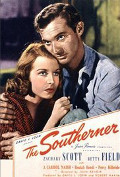
Directed by
Jean Renoir
92 minutes
Rated PG
Reviewed by
Bernard Hemingway

The Southerner
The most acclaimed of Renoir's American films, and his only commercially successful one, The Southerner combines French plein air naturalism with Fordian romanticism (the film was shot near Madera, California with only a few studio-set scenes).
Based on a novel ‘Hold Autumn in Your Hand’ by George Sessions Percy and adapted by Hugo Butler with uncredited contributions by William Faulkner and Nunnally Johnson (Ford's regular screenwriter) the film tells of farm labourer, Sam Tucker (Zachary Scott), who struggles to get an abandoned farm operational despite being dirt-poor, the hostility of his neighbour (J. Carrol Naish) and the vicissitudes of Nature
Renoir brings to the telling his emotive empathy for the struggles of the working poor. particularly those on the land as well as his tasteful mise-en-scène which is realized by Lucien Andriot’s fine black and white photography. The story, such as it is, is familiar stuff, with Tucker doggedly setting about realizing his dream of getting off wages and being his own man.
Understandable as this is (the film opens with his uncle dying in the field while picking cotton for the Boss) one can’t help but wonder if he deserves all that much sympathy as he seems staggeringly ill-equipped for the job, not only having no farm equipment or money but starting his undertaking in Autumn with his wife (Betty Field), two kids and grumpy grandma (Beulah Bondi) squatting in a shack that is close to complete dereliction.
If Renoir idealizes his protagonist, Scott makes for an acceptable if not entirely convincing bib-and-braced hayseed, a more presentable version of the Fordian/Steinbeckian Okie from The Grapes Of Wrath (1940). Betty Field, however as the wife, with her milk white skin, full-body of hair and make-up, barely looks like a farmer’s wife let alone one eking out an existence in the middle of nowhere (she was better suited to her countrified femme fatale role in Lewis Milestone's 1939 version of Of Mice and Men). As for the film's ending which sees the spirited family, whose survival to date has been virtually inexplicable, soldiering on despite what looks like a complete vanquishing, it just doesn't convince.
For fans of the director’s work, and there are many, particularly amongst cinéastes, Renoir’s visual lyricism apparently overrides these reservations. For realists the film may seem just a tad too sentimentalized for it's own good.
Want something different?





